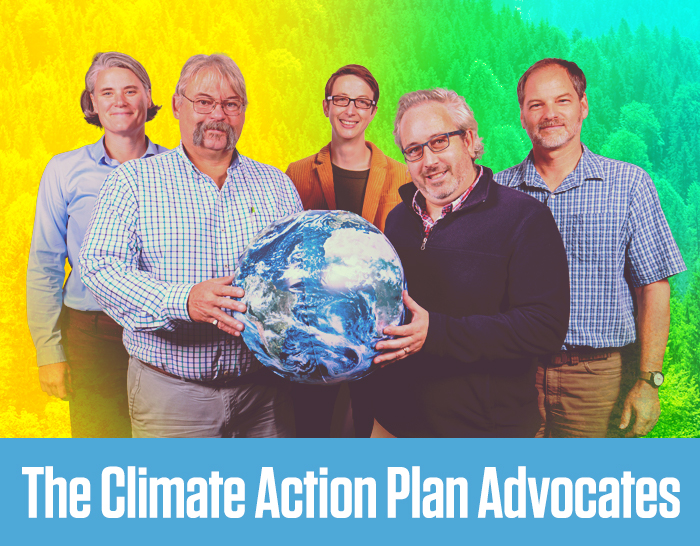Notice of Online Archive
This page is no longer being updated and remains online for informational and historical purposes only. The information is accurate as of the last page update.
For questions about page contents, contact the Communications Division.
Professors David Brandes, Benjamin Cohen, Dru Germanoski, Kira Lawrence, Julia Nicodemus, Lindsay Soh

In 2019, the Board of Trustees unanimously approved the College’s Climate Action Plan 2.0 (CAP). This major sustainability initiative will guide Lafayette on the path of achieving carbon neutrality by 2035. Addressing carbon pollution isn’t a task for individual advocates. A collaborative, multidisciplinary approach is needed.
It’s appropriate then that it was a group of interdisciplinary faculty members who championed climate action planning at Lafayette and ultimately brought the CAP to life (pictured, from left to right): Kira Lawrence, John H. Markle Professor of Geology and department head; Dru Germanoski, Van Artsdalen Professor and chair of environmental science and studies; Julia Nicodemus, assistant professor of engineering; Benjamin Cohen, associate professor of engineering studies; David Brandes, professor of civil and environmental engineering; and Lindsay Soh, Kate and Walter A. Scott ’59 Scholar in Engineering (not pictured).
They were motivated as scientists: Carbon emissions from the burning of fossil fuels raise global temperatures, which can have an enormous impact on weather patterns, water and food supplies, geography, and infrastructure. But also as educators and humanists: The CAP is more than just a pledge to reduce emissions. It furthers the College’s academic mission.
“Having a robust Climate Action Plan not only provides strong affirmation of the College’s articulated commitment to sustainability,” they wrote in the CAP. “It also provides a wealth of educational opportunities. The projects and initiatives proposed in the plan will bring students, faculty, and staff together to use the campus and surrounding community as a living laboratory, to explore and test new models of sustainable systems. In this way, the CAP will enhance the Lafayette educational experience, giving students the knowledge, skills, and confidence to help solve environmental challenges of the future.”
Read about other STEM Stars.
Categorized in: Academic News,
Engineering,
Engineering Studies,
Environmental Science,
Environmental Studies,
Faculty and Staff,
Innovation and Research,
Innovative Teaching and Learning,
Interdisciplinary,
News and Features,
STEM,
Sustainability
